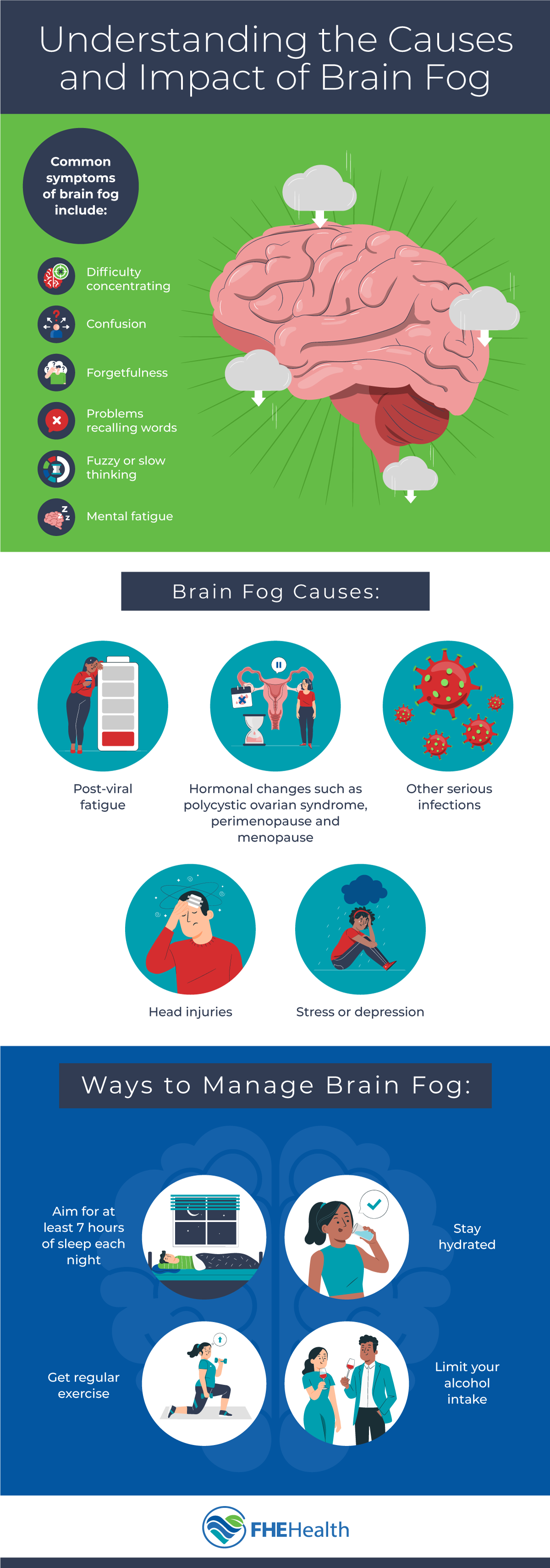
If you’ve ever felt like your brain’s running in slow motion or you just can’t focus, you could have brain fog. There are many different brain fog causes, and the symptoms can be quite debilitating. Finding strategies to manage the symptoms of brain fog can make life easier while you’re recovering from the underlying cause.
What Is Brain Fog?
Brain fog is a colloquial term for the mental clarity decline often associated with long-term fatigue, hormonal changes and chronic health conditions. The term isn’t new. It was first used in the 1800s, but it’s been added back into common conversation in part because brain fog is one of the symptoms of long COVID.
During the pandemic, there was a surge in people experiencing brain fog symptoms . Around 22% of people infected with COVID-19 report brain fog as a symptom, according to research published by Emory University, making the condition a topic of conversation around the world.
Common symptoms of brain fog include:
- Difficulty concentrating
- Confusion
- Forgetfulness
- Problems recalling words
- Fuzzy or slow thinking
- Mental fatigue
Common Brain Fog Causes
Brain fog causes can include post-viral fatigue, other serious infections, hormonal changes such as polycystic ovarian syndrome, perimenopause and menopause, head injuries and stress or depression. Brain fog can feel similar to severe sleep deprivation, and it can be quite difficult for people who are experiencing it to go about their day-to-day lives.
Fortunately, brain fog is not caused by structural changes to the brain, and most people will recover from it once the underlying cause of the symptoms is treated.
How Brain Fog Can Impact Your Daily Life
Brain fog can be distressing for many people. Mental fatigue makes it difficult to do even normal tasks, such as going shopping, reading or managing money. Even carrying on a normal conversation could be difficult and leave someone feeling exhausted when they have brain fog.
One issue people often face is that it’s difficult for those closest to them to understand what brain fog is and how the person is affected by it. All too often, people assume that once the physical symptoms of an illness are gone, the person is now better. Because you no longer “look sick,” it’s assumed you can return to your normal duties.
If you’re struggling to explain the impact of brain fog to friends, family members or colleagues, try sharing medical resources that explain the symptoms of brain fog. If you’re at work or college, talk to the people who are supervising you and try to agree on a gradual return to normal so you can work on coping strategies and adapt to your usual workload.
Strategies for Managing Brain Fog
Brain fog affects people in different ways. Some people experience difficulty focusing, while others become forgetful or find communication difficult. In some cases, people experience a combination of all three difficulties.
If you’re experiencing brain fog, try to find ways to address the cognitive symptoms while also taking care of yourself physically.
Follow a healthy lifestyle:
- Aim for at least 7 hours of sleep each night
- Get regular exercise
- Stay hydrated
- Limit your alcohol intake
Try some of the following strategies to help yourself better cope with brain fog.
Coping With Memory Problems
If you’re struggling to remember things, try making lists or taking pictures of the things you don’t want to forget. For example, write a shopping list before going to the store. If you’re worried about forgetting where you parked your car when you go to the mall, take a photograph of your parking spot.
Try not to rely too much on lists, however. Think of your memory like a muscle, and try to train it. Group information into chunks so it’s easier to remember, and try using association and mnemonics to aid recall.
Improving Your Focus and Concentration
If you struggle to focus because of brain fog symptoms, try to make changes to your environment that will make it easier for you to focus. For example:
- Try using white noise or instrumental music to block out distractions.
- Turn off notifications on your phone while you’re focusing.
- Pick one task to focus on at a time.
- Work in short bursts to reduce your fatigue.
Explain to people that you’re struggling with brain fog and it may take longer than normal for you to get things done. Try to manage expectations so you’re not as stressed about deadlines.
Coping With Communication Difficulties
Brain fog can make communicating with people difficult. If you’re struggling to remember words or you find having conversations with people very challenging, try to reduce the mental load you’re under. For example, schedule meetings for times when you have more energy and try to meet with people one-on-one or in quiet environments so you don’t have to try to process conversations in noisy environments.
Take your time when you’re speaking, and don’t feel like you need to rush to get your words out. It’s likely that what feels like a long pause to you won’t even be noticeable to the people you’re talking to.
Be Kind to Yourself
Brain fog can be stressful and frustrating, but it’s something people do recover from. Practice self-care and be patient. Rushing to get back to normal could simply leave you feeling even more fatigued.
If your brain fog is due to anxiety, stress or depression, treating that underlying issue is the first step toward recovery. At FHE Health, we have a team of compassionate counselors and therapists who can offer confidential support for a variety of issues. We provide multiple treatment options to suit your lifestyle and schedule. Contact us today to book a consultation and start on the road to recovery.







